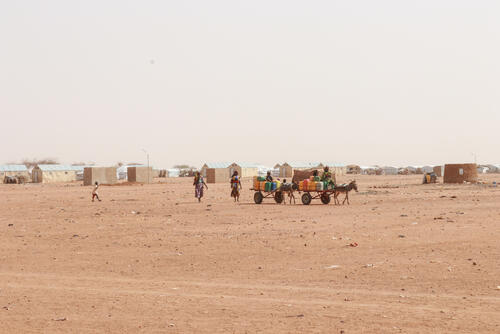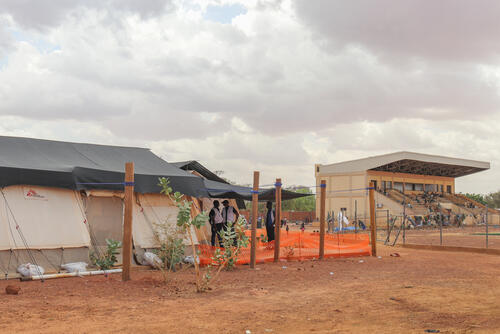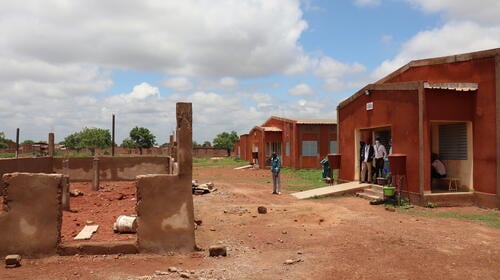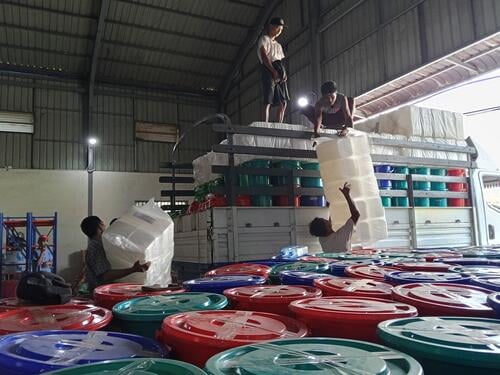Since 2015, people in Burkina Faso have been living through a security crisis that has caused widespread displacement and untold distress. An estimated 1.9 million people have been forced to leave their homeshttps://reporting.unhcr.org/burkinafaso, while more than 500 health facilities have closed or are operating at minimal capacity.
The humanitarian situation is becoming more worrying every week but is widely ignored internationally. As is often the case, the lack of media attention goes hand in hand with a lack of funding for the humanitarian response.
We need other organisations to step up and contribute to free healthcare for people in areas most affected by the conflict, because the needs are enormous.Dr Michel Madika, MSF medical coordinator
Ousseini and his wife were displaced from their home in Silgadji, in the Sahel region of Burkina Faso, and are now living in Kongoussi, 80 km away. “My wife was pregnant,” says Ousseini. “I had to take her to Kongoussi by motorcycle to a health centre. In Silgadji we had no access to healthcare because the health centres were closed.
“The first people to leave when the conflict broke out were the nurses and the health centres that remained open were very far away,” says Ousseini.
In a context of increasing insecurity, the experience of Ousseini and his wife are similar to that of thousands of people who have fled violence in Burkina Faso. Displacement on a massive scale has dramatically increased people’s humanitarian needs and many communities – both displaced people and the host communities – are lacking essentials, including healthcare.
Living in fear on a day-to-day basis, people often face difficulties as they flee their homes. Many roads are unsafe, and people face the risk of being attacked while travelling. In several regions of the country, our teams have set up mobile clinics on the roads, and established advanced health posts in towns and villages, to provide people with free healthcare.
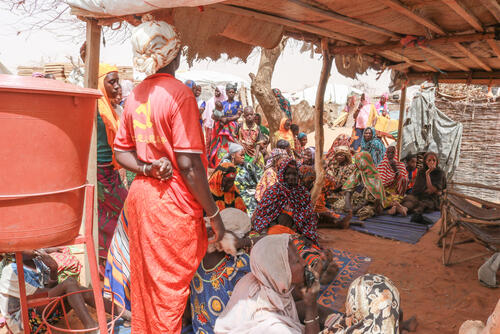
“We are also carrying out community-based activities to be as close as possible to the people, especially those living on the outskirts of towns or in rural areas far from the cities," says Dr Michel Madika, MSF medical coordinator in Burkina Faso.
It can also be hard for medical and humanitarian organisations to reach the people who need help, as travel can be dangerous. In Djibo, a landlocked town in the Sahel desert region, our teams have had to suspend travel beyond the town itself for several months.
The road between the capital, Ouagadougou, and Djibo, is no longer safe due to checkpoints manned by armed groups, ambushes and improvised explosive devices planted on the roadside.
Unfortunately, this is the case in many of the places where we work in Burkina Faso. Even humanitarian flights connecting towns and cities across the country are often suspended for weeks at a time due to insecurity.
The violence is having a negative impact on people’s access to basic social services. People fleeing their homes often arrive with nothing. For them, every consultation in a health centre brings the worry of how they will pay for it.
Unable to afford medical care, Husseini resorted to traditional healers. “As I hadn’t seen a doctor, my only alternative was traditional healers and medicines sold in the market to treat myself,” he says.
As Dr Madika points out, such alternatives are not safe, which is why it is essential that medical care is available free of charge.
“We need other organisations to step up and contribute to free healthcare, not only for children under five and pregnant women, but for all people in the areas most affected by the conflict, because the needs are enormous,” he says. “But how can free healthcare be guaranteed when Burkina Faso has so far only received 15 per cent of the funding planned for 2022 in the humanitarian response plan?”
MSF first responded in Burkina Faso in 1995 as part of the emergency humanitarian response to a large influx of refugees in the Sahel region. Since 2018, our teams have worked continuously in the country, providing medical assistance, distributing essential relief items, providing clean drinking water and training health staff. Our teams in in the country currently work in the regions of Boucle du Mouhoun, East, Centre-North and Sahel.



